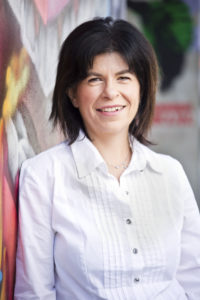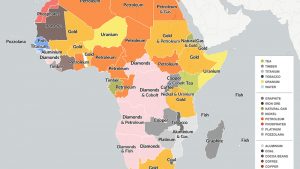 You cannot build products and services and expect them to successfully sell globally, or go ‘viral’, without including the needs and concerns of women.
You cannot build products and services and expect them to successfully sell globally, or go ‘viral’, without including the needs and concerns of women.
For products, especially technology products, to be successful, you need to have women in the conversation, from the idea conception stage to the delivery.
Aniedi Udo-Obong, Google Developer Relations executive based in Lagos, Nigeria gave this advice at the second African Women in Technology Ghana (AWITGHANA) conference held at the Impact Hub, Accra from December 16-17, 2016.
The well-attended conference featured about 23 different speakers across different fields in technology and had over 200 attendees over the three days. Participants came from Ghana, Nigeria, Kenya, Uganda and many other countries. The conference focused on providing solutions to challenges faced by young girls and women in technology over the 3-day period, and sought to bring together bright minds to give talks that are technology focused, interactive and inspirational.
Udo-Obong, speaking on the topic ‘Empowering Developer Communities: Growing With Google Communities’, said“if you are going to build a product that is going to go viral, if you are going to build a product that is going to have two billion users, most of these people are going to be women. So, if there are no women in the conversation about building up products, if you just assume that by making a product pink or red women will like it, shee…[you’ have failed].”
“You know lots of people are making many mistakes doing that. So, it’s really very important for people whom we are building products for to be part of the conversation. And there are a lot of other things we can say about some of the contributions that women give in society generally and in conversations and discussions and it is absolutely suicidal for any company or team building products to attempt to build this world famous or this successful product, without having women in technology,” Udo-Obong explained.
He said that the technology field is currently a male-dominated one, with few women just seen as windrow-dressers. “Technology space has traditionally been dominated by men so it is not unusual to have a company or a team of 10 engineers and find only one woman there or sometimes no women there. And I think this is a result of the prior effect of ‘because there are no women in technology’ ‘we have no women in technology’ and ‘there are no more women in technology’ so you will find there is no woman there.”
Google, which was one of the sponsors of the AWITGHANA conference, has identified this problem and is trying to remedy it. Through its Google Developer Groups (GDGs), akind of in-person developer meet-ups all around the world focused on Google and open technologies. Udo-Obong said Google had used its resources to set up two programs-Study Jam’ and Women in Technology – to bring up more women into the technology space.
Udo-Obong continued: “So Google’s Women in Technology brand is Google’s programme to provide recognition, advocacy, awareness and special resources for women in technology. So there’s a lot of stuff we do, like mini conferences, like this, by contributing to various reports, providing speakers [for conferences], etc. In addition we do things like providing scholarships, we provide grants which could be for building your product, provide travel grants. I think in the last one month, we’ve provided travel grants for about five women from Sub-Saharan Africa, “he disclosed.
Mipe Okunseinde
Mipe Okunseinde, a Harvard cum Cambridge trained lawyer, who works as Senior Counsel, Uber, delivered an inspiring talk at the event.
Uber, a taxi hiring service, helps people to get cheaper, reliable and efficient means of transport through the aid of a mobile phone-enabled application (Uber app).
After narrating her personal story of how she came to work for the technology company and also on the African continent, she revealed that Uber has planned to recruit one million female driver partners by the year 2020.
Okunseinde gave three pieces of advice on how to make it to the top.
“So when you’re dreaming, things to keep in mind is that opportunity is not going to walk up to you with a big splashing sign that says ‘I am opportunity’. Opportunity is also not what will come in straight.
“So it comes up to you to start to connect the dots between opportunities. It starts to connect the dots in a way that there is a picture that you can show ;to people- that explains to them where you’re going and what you’re doing” Mipe Okunseinde says.
She went on: “The second main thing is that your career should not limit you, it should set you free. Very often when we think about what we’re doing, that seems like we are low on …that says this is the less-than-a-career-event, this is less-than-an-opportunity; instead of trying to craft yourself into something that already exists, first look at who you are, what interests you, what attracts you and engages you and then fix something around you.
“The third thing is that you be yourself. Be unapologetically yourself,” she encouraged.
AWIT is the brainchild of Anie Akpe, a New York based computer systems engineer who works in a bank, but desires to reach out to more women with her knowledge and experience. Anie said in her address at the conference:
“56 percent of women in technology leave their employers mid-career. And most events about women in technology tend to focus on learning how to code, but there’s a lot more that goes into building a successful career in technology. Our goal is to level the playing field for women by giving them access to leaders who are changing the face of technology, and actionable tactics that they can use to achieve long term success in the tech industry.”
Later after the conference, Anie Akpe explained to GB&F her motivation for setting up AWIT.
“The primary reason why I wanted to organise this is that I strongly believe in education, that’s number one,” she said emphatically. “Number two, I strongly believe in supporting our community.
“So I grew up in Nigeria, I am based in New York right now, however, as a person in the diaspora who is doing well in the banking sector [in the USA], I pick systems within the bank that we use for my area. So I felt that’s fine for Fintech, but there is more to technology so why not give young women and girls an opportunity to learn more about what’s happening within technology and then also know that it’s a field that they could definitely go into,” Akpe, who also doubles as thefounder of IBOM LLC, organiser of AWIT & Innov8tiv, disclosed.
The first AWIT was held in Kenya a few months ago. Why the choice of Ghana for the second one?
“What’s happening within Ghana is that we don’t’ get very much news about Ghana in the United States, to tell you the truth, unless you are aware of the events that are going on. So we said we get news on South Africa, we get news on Kenya even though we chose Kenya as well but I wanted to see what ecosystem was built within the women [in Ghana]. Of course, I found that there are so many organisations and the only thing we could do was to resource them and that’s fine,” she assured.
By Anthony Sedzro, GB&F





